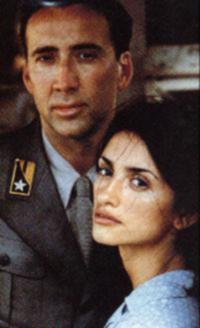Book Review
Captain Corelliís Mandolin By Louis de BERNIÈRES
Vintage Paperback. ISBN 0-7493-9754-3. 36 pages £6:99
Purchase from:
Amazon
UK

Nicholas Cage and Penelope Cruz in the film version,
shortly to be released,
of Captain Corelli's Mandolin
Not since reading Joseph Hellerís Catch 22 have I been so moved by an anti-war novel. Louis de Bernièreís prize-winning novel, the film of which, starring Nicholas Cage as Corelli, is shortly to be released, is set on the Greek island of Cephallonia, mainly during World War II; but also the years to the 1990s (for reasons I will not divulge except to say that the plot takes in the catastrophic earthquake of 1953). The novel begins in idyllic peaceful surroundings with, Iannis, a busy local doctor extracting a pea from a patientís ear only to find the patient wanting it put back again so that he doesnít have to bear listening to his wifeís nagging.
Nice little local observations and character studies emerge, many as hilarious as the pea episode. But tragic farce intrudes in alternate chapters. The pompous and the manic are portrayed - Mussolini emerges as a stupid, vain bully and a cat-hater; while Greek Prime Minister Metaxas is seen as a burnt-out dictator nearing the end of his life and seemingly more concerned about his wayward daughter than impending threats to his country. Elsewhere, a Mussolini-inspired convoluted plot to start a war with Greece causes Italians, Albanians, Greeks and Bulgarians to be involved in pointless bloody skirmishes that send them aimlessly circling around each other to kill and maim one another, like a bunch of cats chasing each otherís tails. The Italian hero of these skirmishes, a kind and amiable homosexual giant, Carlo Guerico, who, after recovering from atrocious wounds, finds himself transferred to Cephallonia with a detachment of Italian troops who outnumber the German forces also occupying the island.
Guerico becomes friends with Captain Antonio Correlli, who is charming and something of a comedian; but he is also a brilliant mandolin player and leads a group of soldiers in singing Italian opera arias and Neapolitan songs. How Correlli falls in love with Pelagia, Iannisís daughter, already engaged to illiterate fisherman Mandras, is the core plot-line in a romance that is thwarted by the tragedies of war. When the Italians switch sides to join the Allies, after the fall of Mussolini, Cephalloniaís occupying forces clash, with catastrophic consequences for the lovers.
De Bernières brilliantly portrays the incompetence and the stupidity of those in command, and the waste caused by so much conflict and tragedy on the beautiful island. First the battles between Italian and German troops; then the brutality shown by Greeks to Greeks when the cowardly, usurping Communists come down from the hills; and, finally, the carnage wrought by the 1953 earthquake.
This is one of those novels that one cannot put down Ė a compulsive read. It is a moving story of a too-easily-forgotten, minor field of conflict. I have high hopes of the soon-to-be-released film and of course it will be interesting to hear how effective the score is, fingers crossed.
Reviewer
Ian Lace





